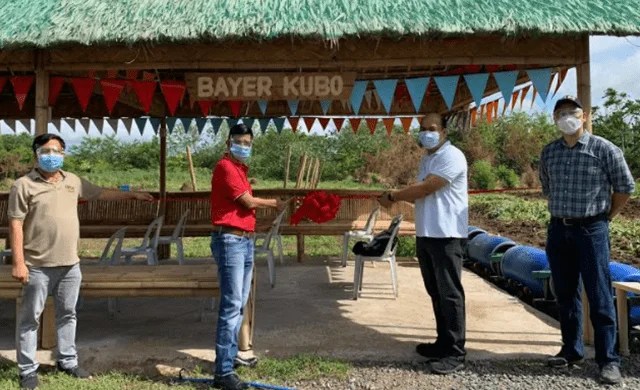Bayer Kubo becomes a center a training center not only for farming but health concerns regarding the Covid 19 pandemic
Life science company Bayer has launched a second vegetable farm to benefit relocated communities in Calauan, Laguna. This is part of the company’s bid to augment food and livelihood requirements for families where needed.
Situated beside Southville 7 in Barangay Dayap, the 2,200-square meter farm is intended to support the regular feeding program in the community and contribute to providing an income source for community residents turned farmers.
“We’re excited to have this second opportunity to reach out to communities and promote agriculture for both food and livelihood,” said Vinit Jindal, managing director of Bayer Philippines. “Our colleagues are passionate about bringing our Bayer vision to life—Health for All, Hunger for None, and this is just one of the many ways on how our contribution can make a positive impact in society.”
Prior to the Bayer Kubo project in Calauan, the first urban farm was inaugurated in Taguig in January 2020 before the COVID-19 pandemic hit the country.
“When we first launched the Bayer Kubo project in Taguig, we had hoped to bring in medical expertise who could impart knowledge on healthcare topics as part of our capabilities,” said Bryan Rivera, head of communications and public affairs, science & sustainability of Bayer Philippines. “As the pandemic led to restricted people movement, we had to postpone these activities. However, the urban farm became a blessing for residents as this allowed them to make good use of their time through growing food right in their backyard.”
The crops initially grown in the Calauan vegetable farm include sweet corn, squash, tomatoes, and bottle gourd. The site also has a seedling nursery and a kubo that serves as a venue for training activities related to recommended farming practices.
For the two projects, Bayer partnered with Rise Against Hunger Philippines as the latter has been active in distributing food through its food bank network, especially during the COVID-19 crisis.
“The community residents here in Barangay Dayap are eager to take care of the farm as they know it would bring them a source of income while supporting the regular feeding program of Rise Against Hunger,” said Jomar Fleras, executive director of Rise Against Hunger Philippines.
“In our agreement, part of the produce will go to the feeding program, the farmer volunteers. It will be managed by Don Bosco Technical and Vocational Education Training (TVET) Center in Calauan.”
Rise Against Hunger is an international hunger relief organization that distributes food and life-changing aid to the world’s most vulnerable, mobilizing the necessary resources to end hunger by 2030.
Father Jeffrey L. Mangubat, administrator and technical director of Don Bosco TVET Center in Calauan, was grateful for having the project established within their training facility.
“We see this as a gateway to encourage the community to look for ways to become self-sustaining by getting involved in farming, whether big or small. We believe that this is not the last initiative of Bayer and Rise Against Hunger as we uplift the lives of families through the Bayer Kubo project and future engagement activities,” he said. MELODY AGUIBA
Bayer Philippines Vinit Jinday (center) leads in harvesting squash at Bayer’s community vegetable farm in Calauan, Laguna



